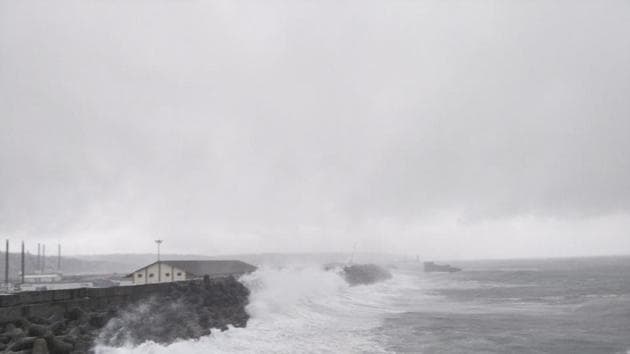Climate change caused deadly Kerala rains: IMD
The extreme rainfall and flooding that devastated Kerala in August, the worst disaster the state confronted in almost a century, were a result of climate change, the ministry of earth sciences (MoES) has concluded after a meteorological analysis of the event.
The extreme rainfall and flooding that devastated Kerala in August, the worst disaster the state confronted in almost a century, were a result of climate change, the ministry of earth sciences (MoES) has concluded after a meteorological analysis of the event.

“Kerala flooding has happened because of extreme rainfall during monsoon 2018 and large amounts of water stored in catchments of reservoirs, which had to be released. It is because of climate change that such disasters happen,” said KJ Ramesh, director general of the India Meteorological Department (IMD), an arm of the MoES.
The percentage of “extremely heavy rainfall” and “dry days” has shown an increasing trend in the past few decades while the frequency of “light to moderate” and “very light “rainfall are decreasing in India — one of the many climate variability and impact of climate change being observed by India Meteorological Department.
“The normals have shifted,” Ramesh said on Friday at a national media briefing on climate change organised by the Centre for Science and Environment (CSE), supporting his presentation with decadal precipitation data.
More than 300 people died in the August rainfall, flooding and landslides that rendered thousands homeless, and left a trail of devastation, wrecking 10,000 km of highways and damaging 45,000 hectares of farmland.
The state government estimated the damage at almost ~20,000 crore.
Climate change refers to seasonal changes over a long period of time caused by the growing accumulation of heat-trapping greenhouse gases in the atmosphere.
Rainfall data for 1951 to 2016 shows that rainfall events of more than 10 to 15 cm per day are increasing while those of less than 5 cm per day are gradually decreasing.
“This is proof of climate change impact. The Intergovernmental Panel on Climate Change’s (IPCC) fifth assessment report had said such impacts will be pronounced,” Ramesh said. hed in Geophysical Research Letters this year also shows that there has been a marked increase in heavy rainfall events in southern and north western India, starting in 2000.
IMD has been working on a report on the causes of the Kerala floods and the accuracy of IMD’s weather model in predicting the event. The findings say that the elevation in Kerala ranges from -48 m below sea level (in the backwaters and other low-lying areas) to +2,692 m (in the hills) above the mean sea level, with 35 % of area between 0-50 m, 39.82 % between 50-500 m and 24 % of the area above 500m.
“More than 75% of the geographical area in Kerala is vulnerable to flooding. They are sitting on the most vulnerable zone. This, coupled with unprecedented rainfall, led to extreme flooding,” said Ramesh, who displayed other rainfall maps showing the west coast would be highly vulnerable to extreme rainfall events in future.
Kerala received 2,377.1 mm rain against a normal of 1,676.3 mm (above normal by 42%). The rainfall over Kerala during June, July and August (1-20 August) was 15%, 18% and 156% above normal, respectively.
“The exceptionally high rainfall in August, 2018... has been due to two consecutive active spells, August 8 to 10 and then during August 14 to 17. Under this rainfall scenario, by the end of July 2018, in all the major 35-odd reservoirs in Kerala, the storage was close to the full reservoir level (FRL) and had no buffer storage to accommodate the heavy inflows from August 8. Continued exceptionally heavy rainfall in August in the catchment areas had compelled the authorities to resort to heavy releases downstream into the rivers leading to widespread flooding,” Ramesh’s presentation said.
The heaviest rainfall was recorded over Idukki district (93% above normal) during the season.
“Our paper published a few years back clearly shows very heavy rainfall incidents are increasing and are followed by long stretches of dry days. Monsoon rainfall is known for continuous rainfall but that is changing,” said SK Dash, professor at the Centre for Atmospheric Sciences, Indian Institute of Technology-Delhi. “Our research has also shown that the Arabian sea and Bay of Bengal sea surface temperature is increasing, which will have a huge impact on aquatic species. There should be scientific studies to understand how warming is affecting fish and other species population. MoES’s findings can be backed by various other scientific studies.”
Ramesh also cited Ockhi, a severe cyclonic storm that devastated parts of coastal Sri Lanka and India last year. “It was a depression that intensified very rapidly to a cyclone. The sea was rough which became disastrous for fishermen. The rapid intensification of the cyclone is due to anomalous warming of ocean, a direct result of global warming,” Ramesh said.
To predict Ockhi type of events, the MoES has launched a coupled ocean atmospheric model which will also help determine the ocean temperature. Since Ockhi transformed very rapidly from a depression to a severe cyclone within about 13 hours, local authorities couldn’t take much preventive action, which kicks in only when a weather event is declared a cyclone.
Hundreds of fishermen from Kerala and Tamil Nadu went missing during Ockhi.
Get Current Updates on India News, Lok Sabha Election 2024 live, Infosys Q4 Results Live, Elections 2024, Election 2024 Date along with Latest News and Top Headlines from India and around the world.



